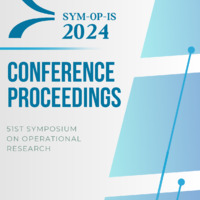Application of auto-cross-regression models from the shortterm forecast of karst spring discharges
Објеката
- Тип
- Рад у зборнику
- Верзија рада
- објављена
- Језик
- engleski
- Креатор
- Vesna Ristić Vakanjac, Veljko Marinković, Ljiljana Vasić, Saša Milanović, Branislav Petrović, Petar Vojnović
- Извор
- Conference proceedings
- Уредник
- I. Džolev , N. Medić, V. Mučevski
- Издавач
- Faculty of Technical Sciences, Novi Sad
- Датум издавања
- 2024
- Сажетак
- Човек je одвајкада је покушавао да пронађе начина да предвиди одређене појаве у природи. Како су људске насеобине углавном биле везане за обале река, предикција поплаве је била од великог значаја за њен опстанак. Касније, развојем цивилизације, а нарочито са индустријском и технолошком револуцијом, отпочиње се са развојем одређених модела којима се на основу улазних компоненти срачунава излазна величина која је од интереса, а у овом случају је то протицај или водостај реке или извора (врела). Најједноставнији модели су модели који се базирају на вишеструкој регресији, а то су ауторегресиони (AR), кросрегресиони (CR) и ауто-кросрегресиони модели (ARCR). Ауторегресиони модели дају добре резултате код врела са узлазним типом истицања, док код гравитационих, чији режим углавном зависи од плувиографског режима његовог сливног подручја, потребно је укључити у модел и податке о падавинама, тако да у ову сврху је најбоље користити ARCR моделе. Како ови модели укључују реалне сумарне вредност падавина, а не ефективне падавине (део укупних падавина који прихрањује издан) често током сушних периода ови модели не дају најбоље резултате. Разлози су ти да током летњих пљускова највећи део ових падавина или испари или се троши на надокнађивање земљишне влаге, тако да ARCR модели коришћењем сумарних дневних падавина забележених током сушних периода дају као излаз пораст на хидрограму, док се у природи то не дешава. Да би се ове грешке умањиле, потребно је користити ARCR модел са покретним просецима. У раду су, поред теоријских основа оба ARCR модела дати и резултати добијени њиховом применом ових модела за потребе симулације истицања карстног врела Ријеке Црнојевића и Гостиљског врела
- Man has been trying to find ways to predict certain phenomena in nature since time immemorial. As human settlements were mostly tied to riverbanks, flood prediction was of great importance for its survival. Later, with the development of civilization, and especially with the industrial and technological revolution, the development of certain models begins, which, based on the input components, calculate the output quantity parameter that is of interest, and in this case, it is the flow or water level of a river or spring. The simplest models are models based on multiple regression, namely autoregression (AR), cross-regression (CR) and auto-cross-regression (ARCR) models. Autoregression models give good results for springs with an ascending type of discharge, while for gravity springs, whose regime mainly depends on the pluviographic regime of its catchment area, it is necessary to include precipitation data in the model, so for this purpose it is best to use ARCR models. As these models include real total precipitation values, and not effective precipitation (part of total precipitation that feeds the output parameter), often during dry periods these models do not give the best results. The reasons for this are that during summer rains episodes, most of this precipitation either evaporates or replenishing soil moisture, so that ARCR models, using the total daily precipitation recorded during dry periods, give as output an increase in the hydrograph, while this does not happen in nature. To reduce these errors, it is necessary to use the ARCR model with moving averages. In the paper, in addition to the theoretical foundations of both ARCR models, the results obtained by their application of these models for the purposes of discharges simulating of the karst spring Rijeka Crnojevića Gostiljsko spring are given.
- почетак странице
- 470
- крај странице
- 475
- doi
- 10.24867/SYMOPIS-2024-51-075
- isbn
- 978-86-6022-703-6
- Просторно покривање
- Zlatibor - Gostilje (Republika Srbija), Rijeka Crnojevića (Republika Crna Gora)
- Subject
- режим, карстно врело, истицање, аутокросрегресиони модел
- regime, karst spring, discharges, autocross regression model
- COBISS број
- 157255177
- Шира категорија рада
- М60
- Ужа категорија рада
- М63
- Права
- Отворени приступ
- Лиценца
- Creative Commons – Attribution-NonComercial 4.0 International
- Формат
- Медија
 V Ristic Vakanjac_RB 241.pdf
V Ristic Vakanjac_RB 241.pdf
Vesna Ristić Vakanjac, Veljko Marinković, Ljiljana Vasić, Saša Milanović, Branislav Petrović, Petar Vojnović. "Application of auto-cross-regression models from the shortterm forecast of karst spring discharges" in Conference proceedings, Faculty of Technical Sciences, Novi Sad (2024). https://doi.org/10.24867/SYMOPIS-2024-51-075 М63
This item was submitted on 8. јануар 2025. by [anonymous user] using the form “Рад у зборнику радова” on the site “Радови”: https://dr.rgf.bg.ac.rs/s/repo
Click here to view the collected data.